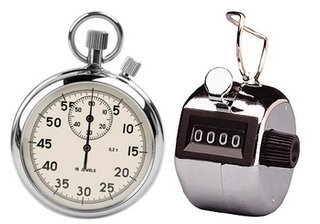measure for measure
rethinking our streets (2)
"The common thread in the new approach to traffic engineering is a recognition that the way you build a road affects far more than the movement of vehicles. It determines how drivers behave on it, whether pedestrians feel safe to walk alongside it, what kinds of businesses and housing spring up along it." WIRED 12.12
If there is one piece of unsolicited advice that I would like BF and the other Metro Manila mayors to hear, it is this:
If you want to improve quality of life in the city,
change the qualitative measure you use
for measuring road performance.
It has become dogma among traffic engineers to measure road design by Level of Service (LOS). LOS has many factorials in the mix but essentially, on highways, LOS is measured at cars per second per mile highway. So the more cars pass at faster speeds, the higher the level of service. On city roads, the LOS is measured along intersections and is calculated as seconds delay per vehicle. So the longer a car is delayed at an intersection, the lower the LOS of that intersection.
Makes sense, if your main interest is keeping the traffic flowing. You can see that logic in play with the MMDA's u-turn slots. The intention of the closing the intersections is to make the road a clear way -thereby reducing seconds of delay, thereby improving the LOS.
So what's missing from the picture? Again, it goes back to thinking of streets only as roadways. It does not account for:
- volume of people moved
- road safety
- effect on commerce along the street
Why are these important?
Move people not vehicles
Counting vehicles instead of people means the bus that carries 50-75 people is equal in count to one person driving a car. Try comparing how much road space a bus with 75 people takes up, vs. 75 cars each with a driver. If you want to increase road efficiency, then you go to the more important factor of counting how many people you can actually get from one place to another.
Faster roads are less safe and less efficient
Increasing vehicle speeds increases the likelihood of accidents. It also makes the road more dangerous for pedestrians and bikers. Plus, it requires you to separate pedestrian traffic by raising the crosswalk.
It is not speed per se that bothers drivers, it is the unpredictability of traffic flow. Slower speeds but smoother flowing traffic is actually preferable to high speed, variable delays roadways.
Road capacity also suffers at higher speeds -faster traffic takes up more space per car than slower trafic. (Read more about the impact of road diets.)
One approach is to look at average vehicle speed and the standard deviation from the speed - then working on reducing the standard deviation, not increasing the speed. Reducing the deviation means smoothing out the traffic.
Commerce dies next to fast streets
Because fast streets feel less safe for pedestrians, commerce at street level dies. It is no accident (no pun intended) that retail flourishes on the slowest intersection of Quezon Avenue. The rest of the avenue (which was designed as a boulevard and has fabulously wide sidewalks) is devoted to seedy nightlife KTV bars that are dead in the daytime.
I know QC is in excellent fiscal health, but imagine how much more they could earn in sales taxes if Quezon Ave. was an active retail destination?
So, to reiterate: If the mayors to improve the city, they must change the qualitative measure they use for measuring road performance.
There are other, newer ways to measure LOS. The Victoria Transport Institute (Canada) publishes several studies on transportation costs and traffic management. There's an excellent one on traffic access and mobility (pdf).
The MM mayors and BF recently visited Vancouver to study the city's best practices on waste management. I can only hope they had the time to study Vancouver's traffic management plan and see how good street design will serve both vehicles and pedestrians and improve the quality of life in our cities.
(I'll be continuing my series on rethinking our streets -but next up: why the Heritage Conservation Society should be fighting rent control.)


No comments:
Post a Comment